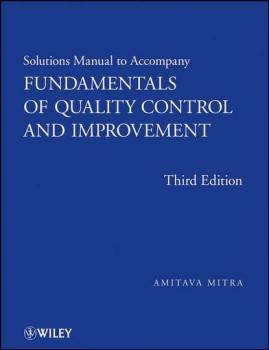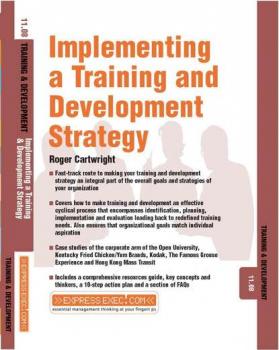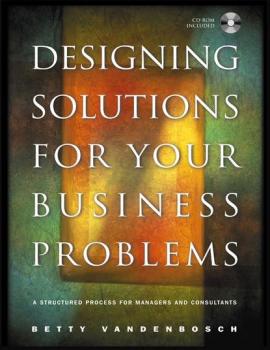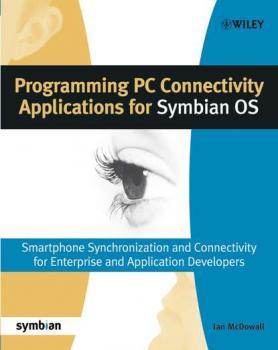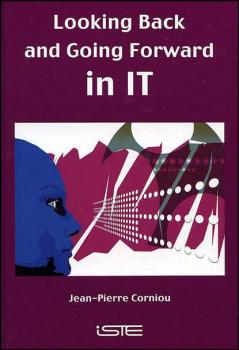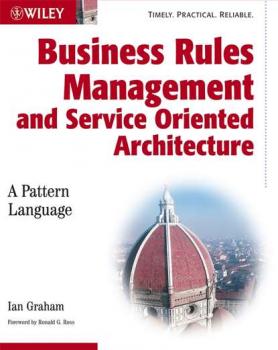Группа авторов
Список книг автора Группа авторовSolutions Manual to accompany Fundamentals of Quality Control and Improvement, Solutions Manual
A statistical approach to the principles of quality control and management Incorporating modern ideas, methods, and philosophies of quality management, Fundamentals of Quality Control and Improvement, Third Edition presents a quantitative approach to management-oriented techniques and enforces the integration of statistical concepts into quality assurance methods. Utilizing a sound theoretical foundation and illustrating procedural techniques through real-world examples, this timely new edition bridges the gap between statistical quality control and quality management. The book promotes a unique «do it right the first time» approach and focuses on the use of experimental design concepts as well as the Taguchi method for creating product/process designs that successfully incorporate customer needs, improve lead time, and reduce costs. Further management-oriented topics of discussion include total quality management; quality function deployment; activity-basedcosting; balanced scorecard; benchmarking; failure mode and effects criticality analysis; quality auditing; vendor selection and certification; and the Six Sigma quality philosophy. The Third Edition also features: Presentation of acceptance sampling and reliability principles Coverage of ISO 9000 standards Profiles of past Malcolm Baldrige National Quality Award winners, which illustrate examples of best business practices Strong emphasis on process control and identification of remedial actions Integration of service sector examples The implementation of MINITAB software in applications found throughout the book as well as in the additional data sets that are available via the related Web site New and revised exercises at the end of most chapters Complete with discussion questions and a summary of key terms in each chapter, Fundamentals of Quality Control and Improvement, Third Edition is an ideal book for courses in management, technology, and engineering at the undergraduate and graduate levels. It also serves as a valuable reference for practitioners and professionals who would like to extend their knowledge of the subject.
Implementing a Training and Development Strategy
Effective Training & Development is essential if you are to continuously get the best from your people and extend the knowledge shelf-life of your company. This module explores the vast array of options available to the HR function including on-the-job learning, formal management education, coaching and mentoring. Cost-effectiveness and measurable payback are also dealt with as cornerstones of any training and development activity.
Designing Solutions for Your Business Problems
Designing Solutions for Your Business Problems is an essential resource for managers and consultants who help organizations resolve ambiguous problems and develop new opportunities. Taking a hands-on, practical approach, Betty Vandenbosch—a leading management consultant and educator—outlines the details on how to conduct a proven process for designing solutions. Designing Solutions for Your Business Problems will teach you how to curtail investigation and generate and justify ideas without sacrificing thoroughness, creativity, persuasiveness, and fit. You will be able to capitalize on more opportunities, and your problem-solving skills will become more efficient and your solutions more compelling. This book will help you design better solutions and design them faster. Betty Vandenbosch offers a variety of useful techniques such as the «scooping diagram,» which provides a framework for action, and the «logic diagram,» which tests the validity of a potential solution. In addition, the book contains illustrative real-life examples of the Designing Solutions approach from a variety of organizations.
Programming PC Connectivity Applications for Symbian OS
The only guide for developers and power users on how to build PC connectivity applications for Symbian OS. This unique handbook provides all the information that is needed for the job. Fully worked examples and a do's and don'ts section provide design recommendations and expose common pitfalls giving a highly practical focus. Explains the relevant parts of the protocols that need to be used Demonstrates how to create your own device side components to provide new services Shows how to handle custom servers and socket servers
Looking Back and Going Forward in IT
This book places IT in perspective by tracing its development through time, covering its origins in business, the massive expansion of the role of IT at the end of the 20th century, the growth of the internet, and the successes and failures of companies involved in this development. Despite its ubiquity in the modern world, the author highlights that efficient use of IT by businesses can only be gained by a good understanding of its potentials and pitfalls, highlighting how its informed use in practice is essential for companies to succeed. Finally, questions are raised concerning the future of IT: who will reap the benefits and why? Will IT continue to provide solutions and will it always deliver on its promise? Will it cease to advance and thus cease to be studied or will it continue to develop and thus provide new opportunities and challenges to users?
Managing the Human Factor in Information Security
With the growth in social networking and the potential for larger and larger breaches of sensitive data,it is vital for all enterprises to ensure that computer users adhere to corporate policy and project staff design secure systems. Written by a security expert with more than 25 years' experience, this book examines how fundamental staff awareness is to establishing security and addresses such challenges as containing threats, managing politics, developing programs, and getting a business to buy into a security plan. Illustrated with real-world examples throughout, this is a must-have guide for security and IT professionals.
Business Rules Management and Service Oriented Architecture
Business rules management system (BRMS) is a software tools that work alongside enterprise IT applications. It enables enterprises to automate decision-making processes typically consisting of separate business rules authoring and rules execution applications. This proposed title brings together the following key ideas in modern enterprise system development best practice. The need for service-oriented architecture (SOA). How the former depends on component-based development (CBD). Database-centred approaches to business rules (inc. GUIDES). Knowledge-based approaches to business rules. Using patterns to design and develop business rules management systems Ian Graham is an industry consultant with over 20 years. He is recognized internationally as an authority on business modelling, object-oriented software development methods and expert systems. He has a significant public presence, being associated with both UK and international professional organizations, and is frequently quoted in the IT and financial press.
Where in the World is My Team?
As the economy becomes increasingly global, businesses need employees who can work in teams that cross borders and transcend physical spaces. In Where in the World Is My Team, fictional character Will Williams shares entertaining anecdotes and practical advice to accustom readers to the challenges of a global, virtual workplace. This easy-to-follow guide, ideal for managers and those interested in succeeding in a global economy, introduces new technologies but focuses especially on the six Key Performance Zones for global team collaboration with briefing report summaries to emphasize key points.
Not-for-Profit Audit Committee Best Practices
How can not-for-profit organizations be sure they play by the rules when the rules aren't clear? Due to recent, very public accounting scandals and the resulting Sarbanes-Oxley Act and other regulations, public companies have strict guidance on financial governance and accounting, including the functions and responsibilities of audit committee members. Though not-for-profit organizations are subject to increased scrutiny, there has been no detailed guidance for their audit committees. This book fills the void and helps not-for-profit organizations answer these questions: * In today's skeptical environment, how can responsible financial governance and reporting reassure wary donors and supporters, and perhaps give the organization a competitive advantage? * How should the audit committee be structured? * Which Sarbanes-Oxley requirements (if any) should the audit committee adopt? * Which best practices best fit the organization's structure and financial reporting needs? Complete with checklists, sample questions, and an index for quick reference, Not-for-Profit Audit Committee Best Practices covers: * Different types and unique characteristics of not-for-profit organizations * The audit committee's role in preventing and detecting fraud * Important internal controls and the internal audit function * The relationship of the audit committee and the independent auditor This heads-up, hands-on guide helps audit committee members select and structure appropriate best practices and function in the most effective manner for their unique not-for-profit organizations. It's also a valuable reference for board members, managers, independent auditors, and advisors of not-for-profit organizations.
Tax Planning and Compliance for Tax-Exempt Organizations
Tax Planning and Compliance for Tax-Exempt Organizations: Rules, Checklists, and Procedures, Fourth Edition is an indispensable guide to navigating the complex maze of nonprofit tax rules and regulations. Along with clear, concise instructions for filing Forms 990 and other important IRS forms and documents, this practical guide covers the significant issues facing nonprofit organizations, including unrelated business income, private inurement, affiliations, and employment taxes. It also provides practical guidance on obtaining the tax exemption; reporting to boards, auditors, and the IRS; testing ongoing tax compliance; and managing lobbying expenditure. An essential, timesaving guide for accountants, lawyers, nonprofit executives and directors, consultants, and volunteers, this Fourth Edition offers: A supplemental, annual update to keep subscribers current on relevant changes in IRS forms, requirements, and related tax procedures. Easy-to-use checklists highlighting such critical concerns as tax-exempt eligibility, reporting to the IRS, and tax compliance. A variety of sample documents, including organizational bylaws, letters of application, and completed IRS forms. Helpful practice aids, such as a comparison chart summarizing the differences between public and private charitable organizations. Practical tips and suggestions for handling such critical situations as preparing for and surviving an IRS examination.
